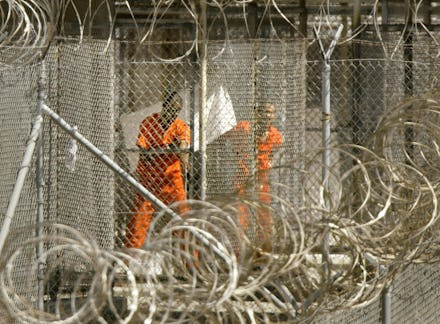Trump kept a Gitmo prisoner detained for 5 extra years. Biden has finally freed him

On July 11, 2016, the United States interagency government panel charged with assessing the case of Guantanamo Bay detainee Abdul Latif Nasser "determined that continued law of war detention of the detainee is no longer necessary to protect against a continuing significant threat to the security of the United States." And yet, despite the panel's recommendation for "transfer only to Morocco, with the appropriate security assurances as negotiated by the Special Envoys and agreed to by relevant USG departments and agencies," Nasser has been kept in the infamous military prison for more than five years past his approved release date — until now.
After 19 years of detention for his alleged, if debatable, involvement with Al Qaeda — during which he was never actually charged with nor tried for a crime — Nasser was returned to his home country of Morocco on Monday, marking the first time a Guantánamo Bay detainee has been released and repatriated under President Biden. Monday's release marks the first time Nasser, who is 56, has left Gitmo since his 30s.
In a statement to The New York Times, a senior Biden administration official speaking anonymously thanked the Kingdom of Morocco "for its willingness to support ongoing U.S. efforts to close the Guantánamo Bay detention facility," while stressing that the White House remains "dedicated to a deliberate and thorough process of responsibly reducing the detainee population and ultimately closing the Guantánamo Bay detention facility."
The eventual shuttering of one of the most enduring and abhorrent symbols of the George W. Bush administration's "War on Terror" has long been a notably unfulfilled goal of subsequent administrations, with former President Barack Obama famously signing an executive order within his first 48 hours in office to close the prison. In the early days of the Biden administration, White House Press Secretary Jen Psaki vowed a "robust" review process would ultimately lead to the detention center's closure.
Under the Trump administration, detainee releases — even those pre-cleared by the review panel — were effectively halted, save for a single transfer of an admitted terrorist who was repatriated to Saudi Arabia to serve out a war crimes sentence there, under a deal made during the Obama years. Indeed, during his initial presidential campaign in 2016, former President Donald Trump vowed to re-fill the cells at Guantánamo Bay with "bad dudes" and, in the chaotic early days of the coronavirus pandemic, reportedly mused aloud about sending infected American citizens to the detention center.
In the wake of Nasser's return to Morocco, State Department spokesman Ned Price urged other nations to follow suit and consider taking the steps to readmit more Gitmo detainees, telling the Times that "Morocco’s leadership in facilitating Nasser's repatriation, alongside its past willingness to return its foreign terrorist fighters from northeast Syria, should encourage other nations to repatriate their citizens who have traveled to fight for terrorist organizations abroad."
According to the Pentagon, "39 detainees remain at Guantanamo Bay."